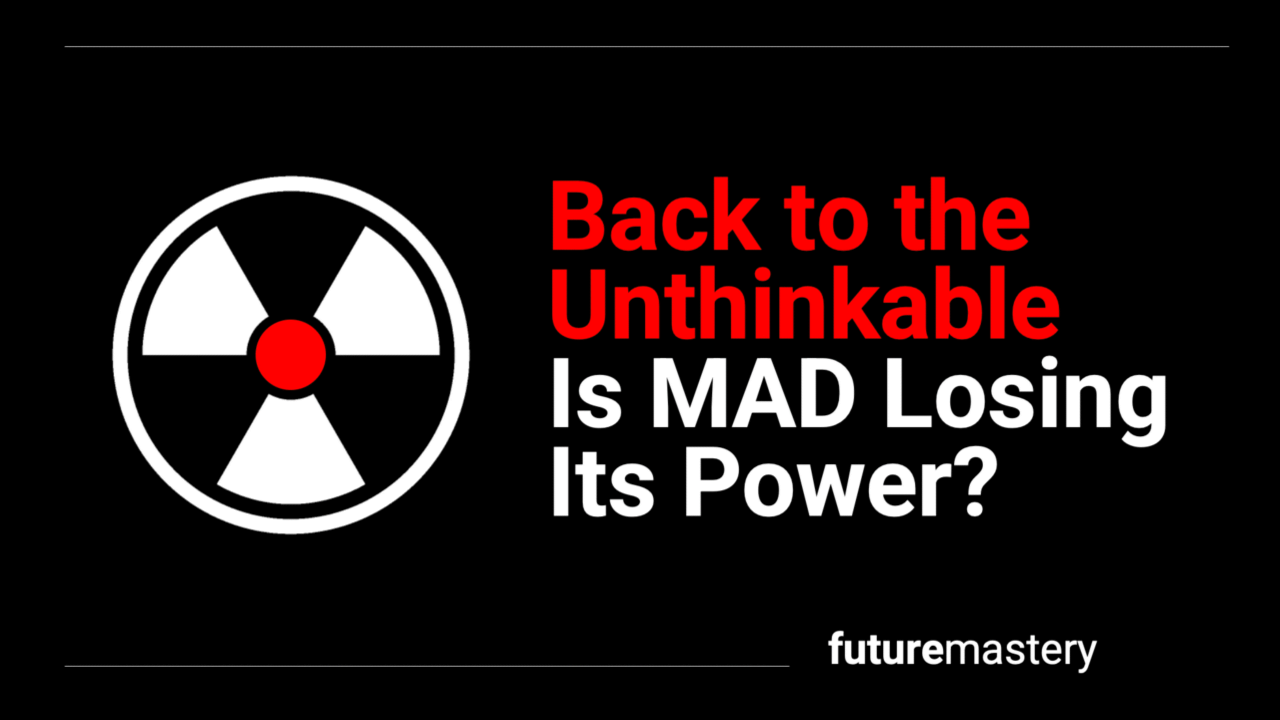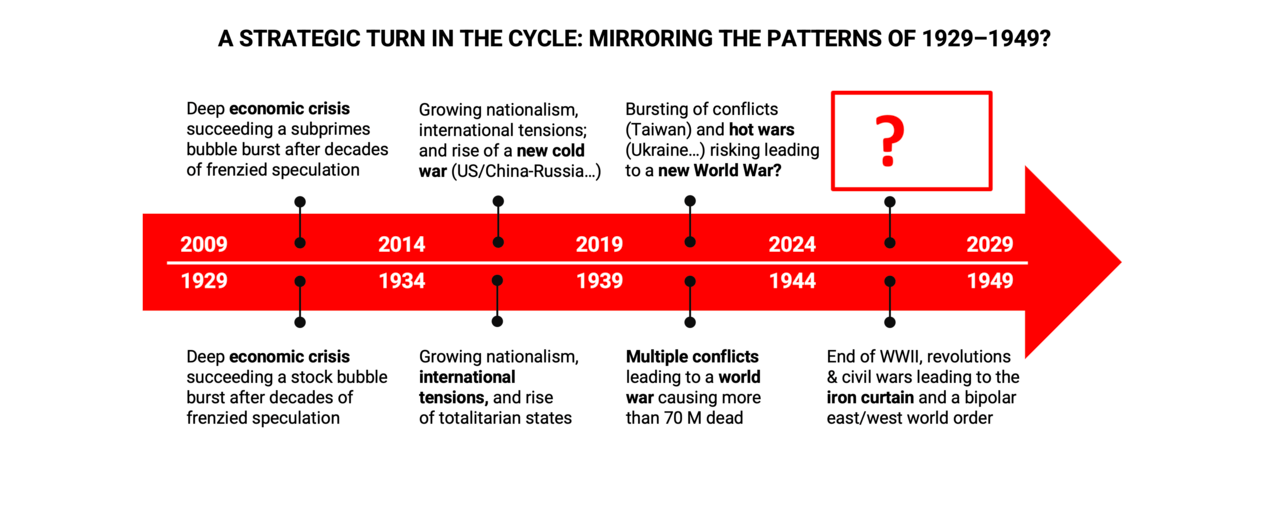Back to the Unthinkable: Is the Balance of Terror Breaking Down?
Jun 23, 2025
In 1949, 4 years after Churchill's "Operation Unthinkable" plan to attack the USSR in June 1945 with Anglo-American-German forces (1), the USA was planning Operation Dropshot. The objective: to launch a preemptive attack aimed at destroying 85% of the USSR's industrial potential using 300 nuclear bombs and 29,000 conventional bombs against 200 targets in a hundred cities. Replaced in 1951 by the Reaper plan, then by the SIOP plan in 1960 - an attack proposal was even presented to Kennedy in 1961 - these projects were fortunately not executed, being set aside in favor of the Cold War due to fear of Mutually Assured Destruction (MAD).
80 years later, have we returned to the era of preventive nuclear attack thinking?
As we emphasized in "3 years of Foresight," we are at a dangerous transition moment, at the junction of generational and secular crises of the Western world, at the crossroads of all possibilities.
 After 3 decades of American exceptionalism, marked by destabilizations in the Middle East and the Balkans, NATO's progression in Eastern Europe, the pivot to Asia and the rise of a cold confrontation with China, and - since 2022 - armed confrontation with Russia, Trump's election had raised hopes for a relative easing of these tensions. Not a return to a peaceful situation, as we had emphasized in "3 shifts & a dilemma." But a shift from the military terrain to the economic terrain, as the trade war had shown.
After 3 decades of American exceptionalism, marked by destabilizations in the Middle East and the Balkans, NATO's progression in Eastern Europe, the pivot to Asia and the rise of a cold confrontation with China, and - since 2022 - armed confrontation with Russia, Trump's election had raised hopes for a relative easing of these tensions. Not a return to a peaceful situation, as we had emphasized in "3 shifts & a dilemma." But a shift from the military terrain to the economic terrain, as the trade war had shown.
The USA's attack on Iran at Israel's request, after weeks of inexorable crisis escalation, shows how powerful the Deep State's recall forces are, shattering the fragile alliance that had been established between MAGA populists and conservatives.
American history has tragically shown how every American administration is always the place where the game of multiple factions, both American and foreign, is played out (2). Given Trump's aggressive negotiation style, marked by escalating threats before concluding a more balanced deal, some expected that tensions would ultimately lead to an agreement, faithful to the "Trump Always Chickens Out" (TACO) adage of recent months.
In the end, the FAFO (F*** Around and Find Out) hardliners will have finally prevailed.
As always, neo-conservative strategists will have argued that the operation is easy. That "Iran is weak". That "the regime will collapse on its own". A rhetoric that had been used against Russia in 2022. With the result we know...
What will come of it, ultimately? The collapse of Iran? The appeasement of tensions after mutual blows, everyone claiming victory and that they have reached their goals? The return of blocs and the containment of the West as a rogue group of nations? A long war? Dramatic escalation, as tactical nuclear strikes are being considered on both sides (Pakistan proposing to give Iran nuclear weapons to retaliate if they suffer a nuclear attack)?
At this stage, nothing is certain, even if the situation seems to be easing.
But one thing is certain: in the best-case scenario, this new Western intervention will leave gaping wounds. The outcome of previous destabilizations orchestrated in the Middle East with the Cebrowski strategy (3) in Iraq, Libya, Syria, etc. does not argue in favor of the promised "return of democracy in Iran." Just as we have not finished paying for the adventurism in Yugoslavia, and probably tomorrow in Ukraine, with the multiplication of banditry, terrorism, and trafficking in Europe.
The American intervention also definitively undermines Western credibility. A surprise attack in the middle of negotiations - despite all rules of international law - gives new credibility to the sobriquet "empire of lies" attributed to the West by the Global South - and notably by Russia. And this at the very moment when it is divided and losing its credibility, as the strong dissensions that appeared at the G7 summit have shown once again.
The intervention, ultimately, leaves the door open to risks of dangerous escalation.
The "Melian moment" (4) that we emphasized in "US versus Europe" is before us.
Make no mistake: this is not a question of morality. History is full of empires and nations that have succeeded in preserving and extending crushing domination through blood. Ibn Khaldun (5) already noted this pragmatically in "Prolegomena".
But we are no longer in the time of triumphant American unilateralism of the 2000s. In the meantime, China has become the world's leading economic - and perhaps even technological - power (6). Russia has recovered and holds the world's largest nuclear arsenal. The BRICS have formed, even if it is still only an informal and circumstantial alliance. The West is now at the periphery of tomorrow's growth zones, which are now in Asia and the Indo-Pacific.
As history cruelly emphasizes, we always know how we start a war. We rarely know in advance how we will end it.
In 1962, at the heart of the Cold War, American physicist Herman Kahn recalled in "Thinking the Unthinkable" how much the prospect of the unthinkable - nuclear war - could not be dismissed and had to be faced. After 80 years of relative balance of terror, we must face the evidence: the risk of mutually assured destruction (MAD) no longer frightens. False flag operations, tactical nuclear bombs, "preventive" attacks: strategists no longer hesitate to consider risky options. The provocations that prompted Russia to suspend its participation in the New START (Strategic Arms Reduction Treaty) program, and the crossing of red lines in Russian nuclear doctrine as with the recent operation attacking their strategic bombers, show how far some are willing to play with fire.
More than ever, faced with the decline of the West, millenarian temptations of a Great Reset by war are taking hold. As Polish psychiatrist Dr. Andrew M. Lobaczewski emphasized in his essay "Political Ponerology," and as we took up in "Zombieland," periods like the one we are living through are those of psychopaths. On all sides.
Perhaps we will have to relearn to think the unthinkable...
'BACK TO THE UNTHINKABLE' is part of our 'Future Frontlines' series. The other posts of this series can be found here >
(1) Operation Unthinkable was a British military plan conceived by Winston Churchill in 1945 to potentially attack the Soviet Union after World War II, using British, American, and remobilized German troops to "impose the will of the United States and the British Empire" on Stalin. Judged very risky and likely to fail by British military planners, the plan was ultimately abandoned. As revealed by archives, the US also planned several preemptive wars against Russia: Operation Dropshot (1949, with projected war start date January 1, 1957), Operation Reaper, developed and approved in November 1950, for a projected war start date in 1954, and the Single Integrated Operational Plan (SIOP), formalized in 1960, which included options for massive simultaneous nuclear strikes against the USSR's nuclear forces, military targets, cities, and even China and Eastern Europe.
(2) The assassinations of several U.S. presidents while in office, including Kennedy, by internal factions—and perhaps even foreign powers—show that no one is safe from extreme political pressure. We saw it again with Donald Trump, who has survived three assassination attempts to date and was recently the target of death threats from certain Deep State networks (the "86/47" affair).
(3) Enacted in 2001, Admiral Cebrowski's strategy sought to destabilize key Middle Eastern countries—such as Iraq, Libya, Syria, Yemen, and Iran—to prevent regional powers from challenging U.S. dominance. By fracturing centralized governments through military interventions, regime changes, and exploiting sectarian divides, it aimed to create chaos and ensure long-term U.S. geopolitical control over critical resources.
(4) See: Europe's Future: Fortress, Fragmentation, or Reform? The Melian Dialogue, from Thucydides’ History of the Peloponnesian War, is a stark illustration of realpolitik and the law of the strongest. In 416 BCE, Athens demanded the neutral island of Melos to surrender or face annihilation. The Melians argued for justice and divine protection, but the Athenians dismissed morality, stating, "The strong do what they can, the weak suffer what they must." Melos refused, leading to its brutal conquest—men were killed, and women enslaved. This episode highlights the harsh realities of power and survival in international relations.
(5) Ibn Khaldun (1332–1406) was a Muslim historian and sociologist who introduced groundbreaking concepts on the rise and fall of empires. He is considered a pioneer of modern sociology and historical methodology. Notably, he was a living witness and commentator on the conquests of Tamerlane, which were marked by extreme violence, destruction, famine, and forced deportations. These campaigns are estimated to have decimated more than 15% of the populations in the Middle East, Central Asia, and Persia at the time.
(6) According to the Critical Technology Tracker from the Australian Strategic Policy Institute (ASPI), China leads in 57 out of 64 identified critical technologies for tomorrow, while the United States leads in 5, and South Korea in 2. The analysis is based on indicators such as high-impact scientific publications, patents, and the concentration of top research institutions.

